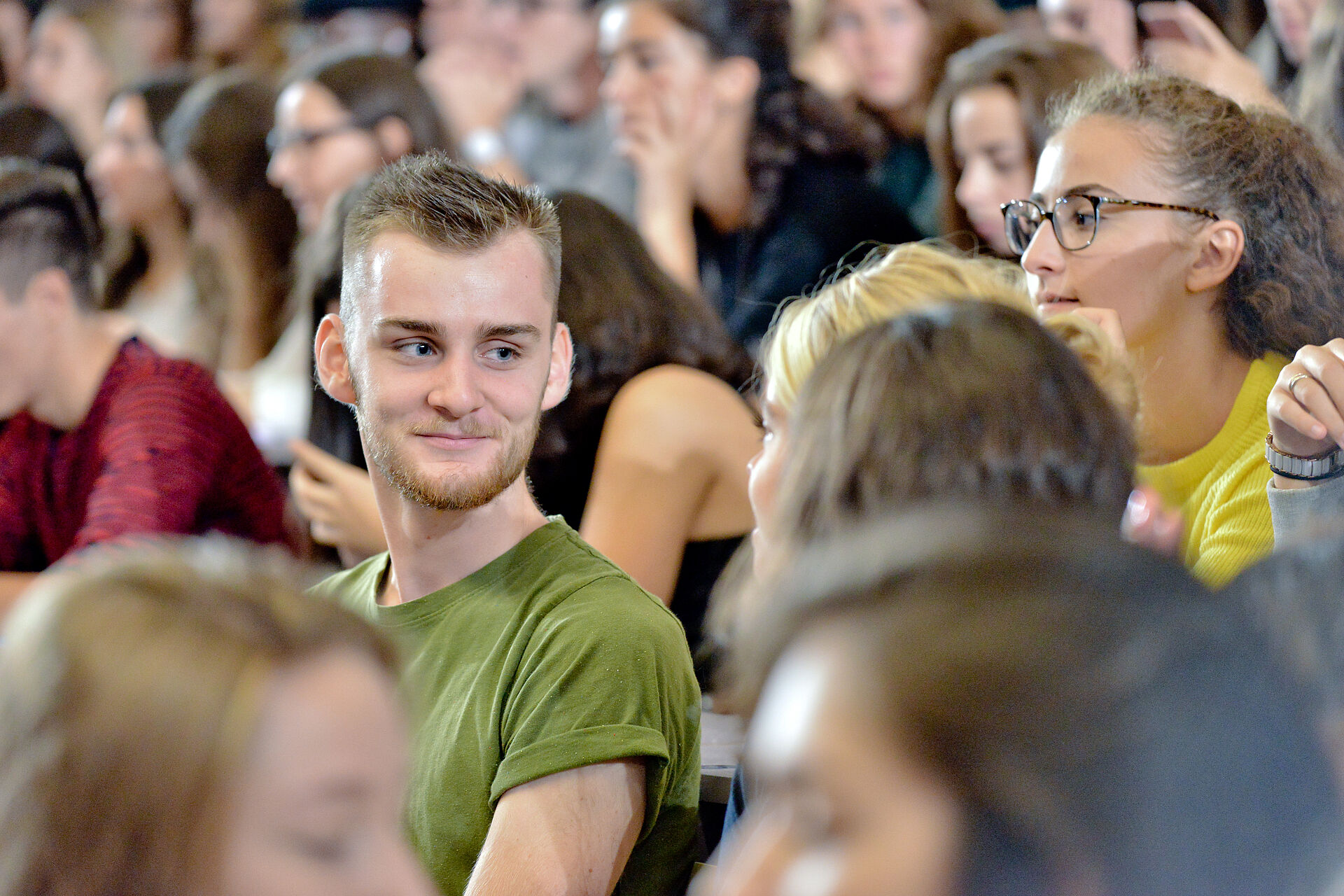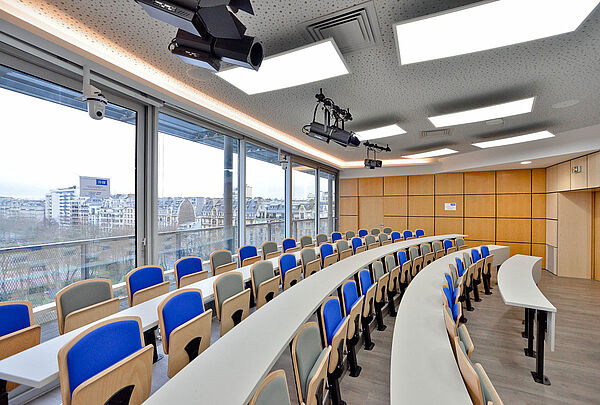Syllabus
Mandatory Courses
- Introductory seminar
Introductory seminar
Lecturer :
Total hours : 6
Overview :
During this introductory seminar, we will define sustainability and situate the concept in a socio-historical perspective. A business case led by our corporate partner CGI on public transport organization will introduce CSR stakes as a transversal matter.
Coefficient : VAL
Learning outcomes :
- Understand organizational stakes of CSR
- Apprehend the role of management control in implementing and controlling CSR policies
- Sustainable Finance
Sustainable Finance
Ects : 6
Lecturer :
- Laurent PAYET
Total hours : 21
Overview :
Course in partnership with Grant Thornton
Coefficient : 1,25
- Accounting for sustainability
Accounting for sustainability
Ects : 6
Lecturer :
Total hours : 21
Overview :
Session 1 : Introduction
Session 2 : Carbon accounting
Session 3 : Materiality analysis
Session 4 : Modelisation of the (un)sustainability
Session 5 : Monetarisation of the issues
Session 6 : SEA and Democracy
Coefficient : 1,25
Learning outcomes :
At the end of this course, you should be able to advise a company on setting up an social and environmental accoutning model tailored to its needs. This include to be able to :
- Analyse the existing accounting modelisation
- Discuss their approach of sustainability
- Organize the identification of the main sustainability issues
- Organize the data collection and indicators production
- Present the organization’s (or project’s) sustainable performance
Assessment :
Case study and an executive summary to be written
- European Regulation for sustainability
European Regulation for sustainability
Ects : 3
Lecturer :
- LEO VAN DEN BUSSCHE
Total hours : 24
Overview :
Two units:
- Lobbying for sustainable development
- Introduction to environmental law for managers
Coefficient : 1
Learning outcomes :
- Articulate control problematics at regulation - organizational level
- Understand the influence of lobbying practices for sustainability
- Acquire a basic toolkit for legal aspects of environmental law in organizations
Assessment :
Rédaction d'une dissertation sur un thème en lien avec le droit de l'environnement validé par le professeur.
Bibliography-recommended reading
Meynier, A. (2016). La notion de mouvement en droit de l’environnement. Revue Juridique de L Environnement, 41(3), 425-438. doi.org/10.3406/rjenv.2016.6887
Van Lang, A. (2025). Droit de l’environnement.
- Organizational approach to ecological transition
Organizational approach to ecological transition
Ects : 3
Lecturer :
Total hours : 18
Overview :
This class aims at giving theorical tools to better understand change in organizations. After an overview of change management, 6 different bodies of theory will be presented to students. These theories are meant to help future managers identify the different aspects of organizations to better accompany change in organizational strategies, goals and cultures towards more sustainable practices.
Coefficient : 1
Learning outcomes :
- Understand how organization theories help us decrypt organizational change
- Develop reflexive thinking
Assessment :
50% Participation in class. This grade relates to class preparedness, presentations or participation for correction of case studies as well as general implication during sessions.
50% Individual assessment
Choosing among 2 mini case studies, you will confront how two different theories presented in class can highlight different aspects of the case.
Cases will be given during the last session.
- Audit RSE
Audit RSE
Ects : 3
Lecturer :
Total hours : 21
Overview :
Ce cours propose aux étudiants de comprendre les principales étapes et outils de l'audit de la CSRD. Il propose ce faisant une interprétation de la CSRD par le prisme de l'auditeur en mettant en lumière les enjeux de cette interprétation du point de vue de la structuration des pratiques.
Coefficient : 1,25
Learning outcomes :
Ce cours doit permettre aux étudiants d'appréhender :
- la méthodologie d'audit ;
- l'approche par les risques de l'auditeur ;
- la vérification de l'analyse de double matérialité
- les outils de contrôle de la conformité
- Governance
Governance
Ects : 3
Lecturer :
- GEORGES CHAPPOTTEAU
Total hours : 18
Overview :
This course will introduce how governance relates to strategies in the organization and how they can impact management. Specifically, different type of organizations and recent denominations such as mission-led companies or B-Corp come with specific responsibilities for organizations.
Coefficient : 1
Learning outcomes :
- Understand the different governance structures and how they relate to CSR obligations
- Identify and recommend strategies for governance
- Management control for sustainability
Management control for sustainability
- Méthodologie du mémoire
Méthodologie du mémoire
Lecturer :
Total hours : 6
Overview :
This course provides a methodology to help students construct their research proposal for their master's dissertation. It will cover the structure of the dissertation, explain how to conduct research for academic articles and expose different data analysis methods.
Learning outcomes :
- Conduct an online academic research for articles
- Construct a problematic
- Design a research proposal, with adequate correspondance between problematic and methodology
- Retournement d'entreprise
Retournement d'entreprise
Ects : 6
Lecturer :
Total hours : 25
Overview :
Cet enseignement, en partenariat avec l'ARE (l'Association pour le Retournement des Entreprises), de déroule sur le semestre sous le mode projet.
Après deux jours intensifs d'enseignements sur les différents aspects du retournement des entreprises (aspects audit, juridiques, management de transition, relations bancaires, communication de crise), les étudiants sont répartis en équipe de 5 personnes environ. Chaque équipe se voit attribuée un cas réel d'entreprise qui a connu des difficultés. Epaulée par un coach, spécialiste du retournement des entreprises et membre de l'ARE, chaque équipe va, au cours du semestre, faire un diagnostic des difficultés de l'entreprise et proposer un plan de retournement. A la fin du semestre, chaque équipe présente son plan de retournement devant un jury de 8 membres dont un est membre du comité de direction de l'entreprise qui a connu des difficultés et est parvenue à se retourner.
Coefficient : 6 ECTS Coefficient 2 (M2 Conseil et recherche en audit et contrôle) 3 ECTS Coefficient 3 (M2 Financial control) 3 ECTS Coefficient 2 (M2 Contrôle, Gouvernance et Stratégie)
Learning outcomes :
Identifier les problèmes d'une entreprise en grandes difficultés.
Proposer des scenarii de sortie de crise qui prennent en compte les intérêts des parties prenantes (fournisseurs, banque, salariés, actionnaires)
Assessment :
30% sur la dynamique de l'équipe
30% sur le dossier préliminaire
40% sur le plan de retournement proposé au jury final
Mandatory Courses
- Politique RSE en entreprise
Politique RSE en entreprise
Ects : 3
Total hours : 18
Coefficient : 1
- Sustainability at work
Sustainability at work
Ects : 3
Total hours : 18
Coefficient : val
- Public Managment
Public Managment
- Institutional integrity
Institutional integrity
Ects : 3
Lecturer :
- CEDRIC BOURGEOIS
Total hours : 18
Coefficient : 1
- Financial institutions and ecological transition
Financial institutions and ecological transition
Ects : 3
Lecturer :
- YANNICK LUCOTTE
Total hours : 18
Overview :
- Investment matters (ESG, balance sheet decarbonation...) - Ethical matters (credits etc.) - Control systems in banking
Coefficient : 1,25
Learning outcomes :
- Understand sustainability stakes in banking
- CSR Reporting
CSR Reporting
Ects : 3
Lecturer :
Total hours : 21
Overview :
This course reviews the various rules and regulations regarding sustainability reporting with a focus on GRI framework, IFRS sustainability standards, the European regulations (CSRD, ESRS).
The course insists on the diverse conceptions and orientations of CSR and sustainability reporting and tries to offer a critical analysis of CSR guidelines and regulations
- Through the confrontation with CSR reporting practices (CSR reports)
- Through a comparative analysis with financial reporting
Coefficient : 1,25
Recommended prerequisites :
A course on the basics of financial reporting is recommended.
Learning outcomes :
The aim of the course is to allow students to get acquainted with the various guidelines, regulations and standards of CSR reporting.
- In a historical perspective: from soft guidelines (GRI, …) to compulsory rules (CSRD, ESRS)
- Through a variety of viewpoints (standard-setters / preparers / users) and orientations
- Through the various dimensions of CSR (Environmental, Social, Governance)
Following this course, students should be familiar with the various guidelines and regulations related to CSR reporting.
Assessment :
Continuous assessment: 50 % (oral présentation + participation)
A terminal examination: 50 % (analysis of a CSR report)
- Transversal seminar (PSL Weeks)
Transversal seminar (PSL Weeks)
Ects : 3
Total hours : 24
Coefficient : VAL
- Soft skills + HR for managers (FR)
Soft skills + HR for managers (FR)
Ects : 3
Total hours : 18
Overview :
Learning to recognize your motivational levers
Coefficient : VAL
Learning outcomes :
Learning to recognize your motivational levers
- Dissertation
Dissertation
Ects : 6
Overview :
The master's dissertation provides students with the opportunity to investigate in-depth a problematic based on both academic research and fieldwork. It enables students to become experts on a domaine, and link their professional experience with the academic outcomes of the program.
Coefficient : 1,25
Learning outcomes :
- Develop a research proposal
- Academic writing in English
- Internship
Internship
Overview :
Internship of 4 to 6 months, mandatory, in France or abroad Students with a permanent job offer are exempted from completing an internship
Coefficient : VAL
Learning outcomes :
Professional induction
Academic Training Year 2025 - 2026 - subject to modification
Teaching Modalities
This program, only in initial training, lasts for 368 hours across both semesters. The program is held full time at the Paris Dauphine campus. The first semester lasts from September to December and the second semester from January to March, followed by an internship. The program is mostly taught in English. However, in order to get the most out of our project-based pedagogy, business projects in partnerships with corporations are taught in French.
Program specificities:
- Courses taught by corporate partners (such as Mazars and Grant Thornton, Carbone sur Factures), academic specialists and professional experts of their field
- Project-based pedagogy: restructuring, carbon accounting, consultancy projects, CSR implementation.
- Master’s dissertation to bridge problematics from the internship with theoretical knowledge
- Mandatory internship of 4 to 6 months (except if permanent job offer)
- Participation in a class trip
Internships and Supervised Projects
Initial training track’s students must complete a 3 to 6 months long internship which can take place abroad to further the international benefits of this English-taught program.
Students with a permanent job offer can be exempted from this internship.
Students participate in a class-wide project based on real business cases for turning around companies.
Research-driven Programs
Training courses are developed in close collaboration with Dauphine's world-class research programs, which ensure high standards and innovation.
Research is organized around 6 disciplines all centered on the sciences of organizations and decision making.
Learn more about research at Dauphine


